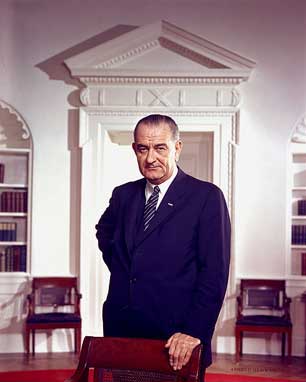Did you know that Truthout is a nonprofit and independently funded by readers like you? If you value what we do, please support our work with a donation.
Fifty years after Lyndon B. Johnson made it the centerpiece of his first State of the Union address on Jan. 8, 1964, the War on Poverty remains one of the most embattled — and least understood — of Great Society initiatives.
Yet, it’s an anniversary worth celebrating, despite historical memory distorted by decades of partisan attack, both for the commitments and priorities it reflected, and for the insights it offers into the political challenges of fighting inequality today.
The War on Poverty was still very much in the planning stages when LBJ made his historic pledge, though its broadest outlines were sketched out in the speech and in the 1964 Council of Economic Advisers Report: a fast-growing, full-employment economy; an all-out “assault” on discrimination; investments in education, job training, and health care; and locally organized programs of community action, planned with what would only later be added as a legislative mandate for “maximum feasible participation” of the poor.
Opportunity was the initiative’s keyword, enshrined in the enabling legislation, and the newly-created agency, the Office of Economic Opportunity, that became its administrative home.
Contrary to conservative detractors, the War on Poverty did not create “special privileges” for the poor. Still less was it a vast expansion of “dependency”-inducing cash relief, relying far more on preventative health, nutrition and old-age related expenditures to shore up the federal safety net and on signature programs such as Head Start, Job Corps, and community-based housing and economic development to create opportunities for advance.
More controversially, community action programs encouraged poor people to organize for basic rights that better-off Americans had come to expect as citizens of the world’s most affluent democracy and beneficiaries of the New Deal welfare state: to decent job and educational opportunities, fair labor standards, protections against economic insecurity, legal representation, and access to political participation, starting with the right to vote.
For this the War on Poverty earned the enmity of a wide array of politically-entrenched constituencies, from the Jim Crow South to the big-city liberal North and West. It also drew the ire of many erstwhile supporters, including LBJ himself, who put pressure on OEO administrators to keep a lid on spending and to rein in community action even as he escalated spending on fighting communism in Vietnam.
LBJ’s policies did not end poverty — a fact conservatives, having long since argued that government had no business fighting in the first place, have recently twisted into a narrative of failure used to justify further cuts in the social safety net. But that shouldn’t keep progressives from drawing lessons from its shortcomings as well as its accomplishments in building a campaign against inequality.
One is the importance of fighting the battle at the level of economic policy and structural reform rather than relying on redistributive social welfare policies alone. LBJ’s economists recognized this in their push to move beyond budget-balancing orthodoxy to reduce unemployment (then at 5.5%) to more acceptable (3-4%) full employment targets. But they held back by relying on growth-stimulating tax cuts while downplaying the need for strategies to generate jobs in the nation’s de-industrializing urban and rural communities.
A second is that the problem of poverty cannot be resolved without addressing the deeper inequities of race, class, gender, geography and power — a lesson overshadowed by the myth of a “culture of poverty” that gripped policy elites in the 1960s and continues to thread through popular and academic discourse to this day.
Third is that some of the fiercest battles of the War on Poverty were fought locally, as they continue to be today. This brings us back to the militant politics of massive resistance, which — then as now — played out in struggles over who would control the implementation of anti-poverty policies and resources and, financial incentives notwithstanding, whether they would be implemented at all.
But it also calls up the progressive organizing unleashed by community action, which continues to sustain the legacy of the grassroots War on Poverty in community-based movements for living wages, immigrant rights, and the right to health care today.
And fourth is the need to dethrone the narrative of failure, in ways that go beyond the War on Poverty’s penchant for “maximum feasible public relations” and statistical cost/benefit analysis to recognize not just the capacity, but the political and moral imperative of committing the resources of democratic government to achieving a just and equitable economy.
Trump is silencing political dissent. We appeal for your support.
Progressive nonprofits are the latest target caught in Trump’s crosshairs. With the aim of eliminating political opposition, Trump and his sycophants are working to curb government funding, constrain private foundations, and even cut tax-exempt status from organizations he dislikes.
We’re concerned, because Truthout is not immune to such bad-faith attacks.
We can only resist Trump’s attacks by cultivating a strong base of support. The right-wing mediasphere is funded comfortably by billionaire owners and venture capitalist philanthropists. At Truthout, we have you.
Truthout has launched a fundraiser to raise $45,000 in the next 8 days. Please take a meaningful action in the fight against authoritarianism: make a one-time or monthly donation to Truthout. If you have the means, please dig deep.
